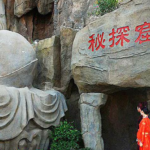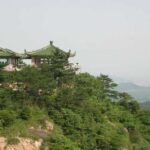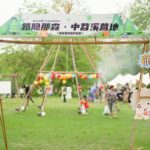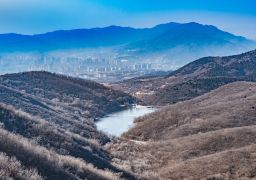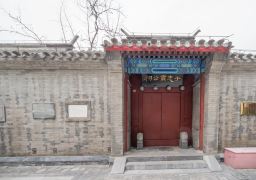The Ancient Qiantang Gate is an ancient city wall in Hangzhou with a long history. In the 11th year of the Kaihuang era of the Sui Dynasty (591), the state was moved to the west of Liupu, at the foot of Phoenix Mountain, building a city around the mountain, with a circumference of thirty-six miles and ninety steps. The northwest city gate was called Qiantang Gate. In the fourth year of the Wude era of the Tang Dynasty (621), to avoid the taboo of the national title, Qiantang was changed from Qiantang to Qiantang, and the gate name followed suit. In the 28th year of the Shaoxing era of the Southern Song Dynasty (1158), a pavilion was built on top of Qiantang Gate, from which one could overlook the West Lake, with the morning sun and evening shade, presenting a variety of atmospheres. There were many Buddhist temples and towers outside the gate, and those who went to Lingzhu to offer incense often came and went through this gate, which led to the saying ‘Qiantang Gate outside, fragrant baskets of children’. Inside the gate, there were Jingling Palace, Qiantang County Government, Qiantang School, and Shangfang Temple. At the beginning of the Yuan Dynasty, the gate was destroyed. In the 19th year of the Zhizheng era of the Yuan Dynasty (1359), the Zhang family rebuilt Qiantang Gate on the original site, which still existed until the Qing Dynasty, located in the northwest corner of the flag camp. In 1913, after the flag camp was demolished, Qiantang, Yongjin, and Qingbo gates and the city walls were also demolished. The city base was built into Hubin Road, Nanshan Road, and Hubin Park, connecting West Lake with the city. In 2002, Hubin Road was renovated, and the green space around the site of Qiantang Gate was integrated into the Shengtang Gate scenic area, becoming a leisure place for citizens. To let future generations understand the history of changes, in 2005, during the renovation of Qingchun Road, a stone was erected here to commemorate. Open all year round, open all day long.
Ancient Qiantang Gate
The Ancient Qiantang Gate is an ancient city wall in Hangzhou with a long history. In the 11th year [...]

